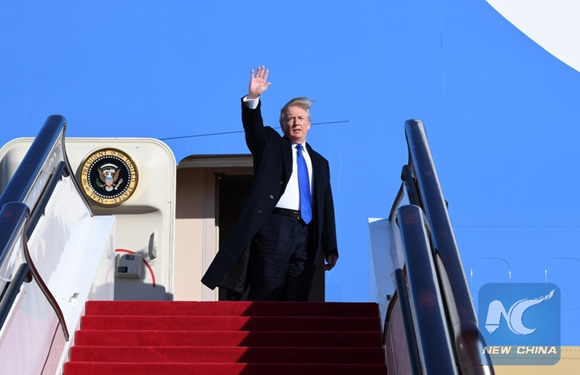
U.S. President Donald Trump leaves Beijing on Nov. 10, 2017, concluding his state visit to China. (Xinhua/Zhang Ling)
As Air Force One touched down at Joint Base Andrews in the U.S. state of Maryland Tuesday night, U.S. President Donald Trump ended his first Asia trip, also the longest one by an American president in the past 25 years.
Showing U.S. interest in the region, Trump's multi-tasked tour also advocated "America First" by putting an overemphasis on bilateral trade, touted the "Indo-Pacific" policy and reassured allies.
FROM "AMERICA FIRST" TO U.S. ISOLATION
One of the key messages delivered during Trump's Asia tour, which took him to Japan, South Korea, China, Vietnam and the Philippines on Nov. 3-14, was his hard-edged "America First" economic agenda.
Addressing a gathering of Asian-Pacific leaders in Vietnam, Trump said explicitly that the United States would no longer tolerate "chronic trade abuses" from the region or enter into large agreements that "tie our hands."
"We are not going to let the U.S. be taken advantage of any more," said the U.S. president, facing a muted audience at the Asia-Pacific Economic Cooperation (APEC) CEO Summit where a consensus favoring multinational trade pacts was long applauded.
Trump's speech received harsh criticism from U.S. scholars who argued it made the world's super power more alienated.
Calling it "a vitriolic, nationalistic speech," Susan Rice, former U.S. national security adviser under Obama administration, said it only "made the United States look angry and rendered us more isolated."
The Trump administration's views were "irrational on trade," Douglas Paal, vice president for studies at the Carnegie Endowment for International Peace, told Xinhua in Beijing.
"Bilateralization of trade is done by people who are ignorant of the real drivers of deficit spending," the leading U.S. expert on international relations added.
Trump's appeal to economic protectionism also came amid an effort to revive a regional trade pact which Trump ditched early in his presidency.
On the sidelines of the Vietnam meeting, 11 remaining Trans-Pacific Partnership (TPP) countries announced a framework to remake their deal without the United States.
"Had we started without the United States, we could have worked out a deal," said Singaporean Prime Minister Lee Hsien Loong last month while visiting Washington.
"INDO-PACIFIC" POLICY, TOO EARLY TO TELL
During his 12-day trip, Trump also touted the importance of the "Indo-Pacific" notion as his administration's new Asia strategy.
The strategy, recently introduced by U.S. State Secretary Rex Tillerson in a speech outlining the future "strategic partnership" between Washington and New Delhi, entails increased cooperation between the United States, India, Japan and Australia.
The foreign affairs officials from the four countries, or "Quad," met in Manila on Sunday to discuss "their shared vision for increased prosperity and security" in the region.
However, so far scant detail has been provided about the "Indo-Pacific" policy. Nor has it been explained how it differs from former U.S. President Barack Obama's "Asia pivot" strategy.
How the Trump administration works to realize the full potential of the Quad "will be the strategic question to watch," wrote Alyssa Ayres, a senior fellow in the U.S. think tank Council on Foreign Relations (CFR), in a blog on its official website.
For Douglas Paal, the Trump administration has not clearly articulated the strategy in detail. "So we have a hard time guessing what the ultimate purposes (are)," he added.
ALLIES WITH RIFTS
Of the five Asian legs, Japan and South Korea were the first two, where Trump's relatively measured words left the important allies reassured of the U.S. commitment to their security.
"(President) Trump has stayed on script, deepened relationships with his counterparts," commented Scott Snyder, a senior fellow for Korean Studies at CFR.
The hosts were all eager to give Trump "a warm and very personal welcome," Paal told Xinhua. However, there were still rifts revealed among the "ironclad" allies.
In Japan, Trump grumbled about Japan's "massive" trade surplus with the United States, saying it's "not fair and not open." He dismissed again the idea of rejoining the TPP, a trade deal which Japan has been keen to push forward.
In South Korea, Trump also complained the bilateral free trade pact was "unsuccessful and not very good for the United States."
Meanwhile, the U.S. president's remarks on the Democratic People's Republic of Korea (DPRK), a next-door nuclear threat for Japan and South Korea, had been swinging during the trip, which may spark a sense of unease among the two Asian countries.
On Nov. 7, Trump told a press conference in South Korea that he did not wish to use force against the DPRK, urging Pyongyang to return to a negotiation table.
On the following day, the U.S. commander-in-chief, while addressing the South Korea's National Assembly, said to the DPRK: "Do not underestimate us. And do not try us," indicating a possible military intervention was still an option on the table.
Trump's Asia trip showed good personal diplomacy, noted Ely Ratner, once deputy national security adviser to former U.S. Vice President Joe Biden, on Twitter. "But messages were too muddled to reassure region about future direction of U.S. Asia policy," he added.


















































